A First-Timer’s Guide to Shopping at Bulk Stores
Bulk stores make shopping plastic-free and zero waste so much easier. They allow us to avoid unnecessary packaging, and buy only what we need (no unnecessary food waste). But they operate quite differently to regular stores and supermarkets, and if you haven’t shopped at one before, the idea can be a little intimidating.
If you’re new to living plastic-free and zero waste, and find the idea of shopping at bulk stores a little nerve-wracking, I’ve put together a guide to help you out. No two bulk stores are exactly the same, but the principles are.
I believe that we should be embracing these types of shops where we can, and there’s no need to be intimidated!
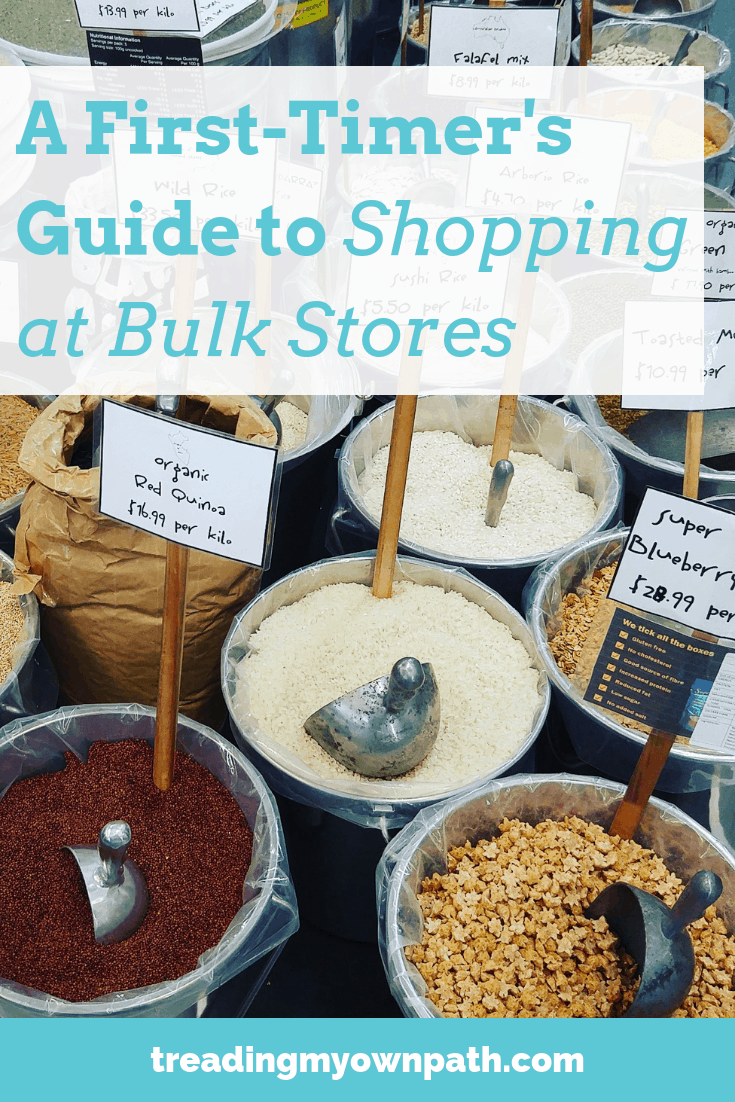
Shopping at Bulk Stores – Before You Leave Home
The first thing I’d recommend you take is a shopping list. Go through your pantry and decide what you need before you get there. Browsing in a store you’ve never been in before can be a little overwhelming, and it’s easy to spend more money than you intend on ingredients that you didn’t really need.
Second, think about how you intend to buy your groceries. If you want to avoid packaging you might want to bring glass jars, containers or reusable produce bags. However not all bulk stores are set up the same.
For a first shop, I’d recommend taking reusable produce bags rather than jars or containers. (If you don’t have reusable produce bags and want to invest in some, you can find my online zero waste stores guide here.)
I shop at the Source Bulk Foods (and there are 50 of these stores across Australia and New Zealand) and these stores are set up for customers to bring their own containers. I can take a bag full of empty glass jars, the team will weigh them for me and record the weight on the jars, and then I can fill them up. When I get to the till the weight of the jar will be subtracted from the total, meaning I only pay for the weight of the actual products I buy.
Not all bulk stores offer this service. Maybe they don’t have the technology, maybe they don’t have the staff training, or maybe they just don’t want to. In these stores, using glass jars will be an expensive exercise as you’ll end up paying for the weight of the jar as well as the product. Reusable produce bags are the best alternative.
If you really want to use containers, consider ringing ahead and asking if they will be able to tare the weight, and how it works.
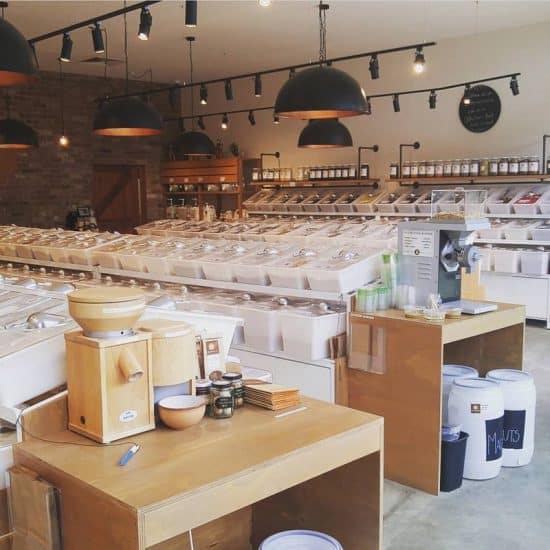
Shopping at Bulk Stores – Once You Arrive
Shopping at a bulk store is a very different experience to shopping at a supermarket. It’s extremely likely that the staff are as passionate about reducing waste as you are, and they will be more than happy to help. If you’re unsure in any way, I’d recommend going straight to a staff member and explaining that you’re new to this way of shopping, and asking how their store works and if there’s anything you need to know.
Ask them about different containers, and if they have preferences. Ask what other customers do. Start the conversation!
Some bulk stores might allow you to weigh your own containers. Some might ask that you write the code number of the product down (many people using their own jars do this by writing the numbers in their mobile phone as they go) to present at the till.
Some might print their own labels which just need scanning at the till. Ask to find out how your store works.

Shopping at Bulk Stores – Other Things to Consider
If we are used to supermarkets, we are much more used to unit prices (such as x price for a jar of peanut butter) rather than price per kilo. Even though supermarkets will list these prices, we don’t tend to pay much attention. This can be confusing at the start when shopping at bulk stores, because we often don’t have much idea how much things weigh. For example, chocolate coated nuts are quite heavy, so they might not sound expensive per kilo but a bag full can be more expensive than expected! On the other hand, items like tea can seem very expensive per kilo, but a full jar will not weigh much and be more affordable than the price suggests.
If you’re on a budget, for the first few shops I’d recommend getting a receipt, and tracking how much things cost, and making adjustments next time. I learned the hard way that big jars full of chocolates hurt my pocket!
Most things sold at bulk stores are sold by weight, but occasionally products are sold per unit (priced “each”) and some liquids will be sold by volume. The price label will always tell you how you will be charged. If a liquid is sold by volume, you will need to know the volume of the container rather than the weight (such as knowing the jar is 500ml or a litre).
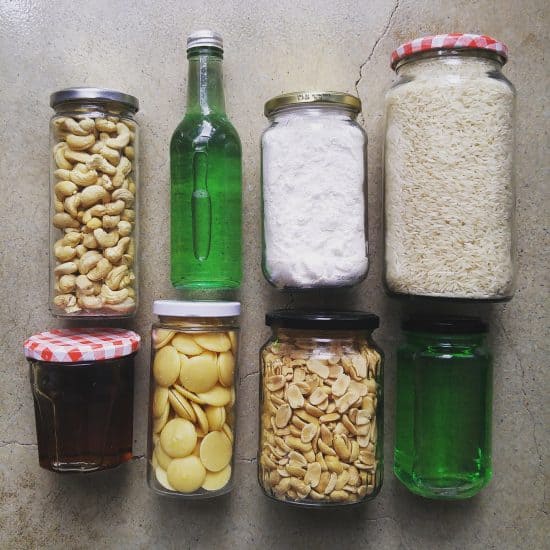
If you do make a mistake, the store will help you sort it as best they can. They deal with a lot of containers and will have a good idea of the weight (if you forgot to weigh it) or the volume (if it doesn’t say on the container).
Whilst I’m shopping, I like to take note of the other ingredients that I see. If I see something interesting, I’ll head home and read up on how to prepare or cook it, and look up some recipes. If I decide I’d like to try it, I add to my list for next time. This works better for me than buying random ingredients that then sit in the cupboard untouched.
We’re often used to heading to the supermarket every week, but bulk stores can be approached a little differently. If you live far from a bulk store, getting super organised can mean you only need to head there every few weeks – the products they sell have a long shelf life, so there is no need to head in weekly. On the other hand, if you prefer to pop in every few days rather than stockpile, that works too.
Whichever you prefer, bulk stores offer more freedom than supermarkets to choose how you’d like to shop. They’re also friendly places, selling real food, and owned by real people rather than faceless corporations. What’s not to love?!
Now I’d love to hear from you! What practices does your local bulk store use? Are there any quirks that you’d like to share? Any other tips on bulk shopping? If you’re new to the idea, any questions we haven’t covered? Please share your thoughts in the comments below!
[leadpages_leadbox leadbox_id=1429a0746639c5] [/leadpages_leadbox]
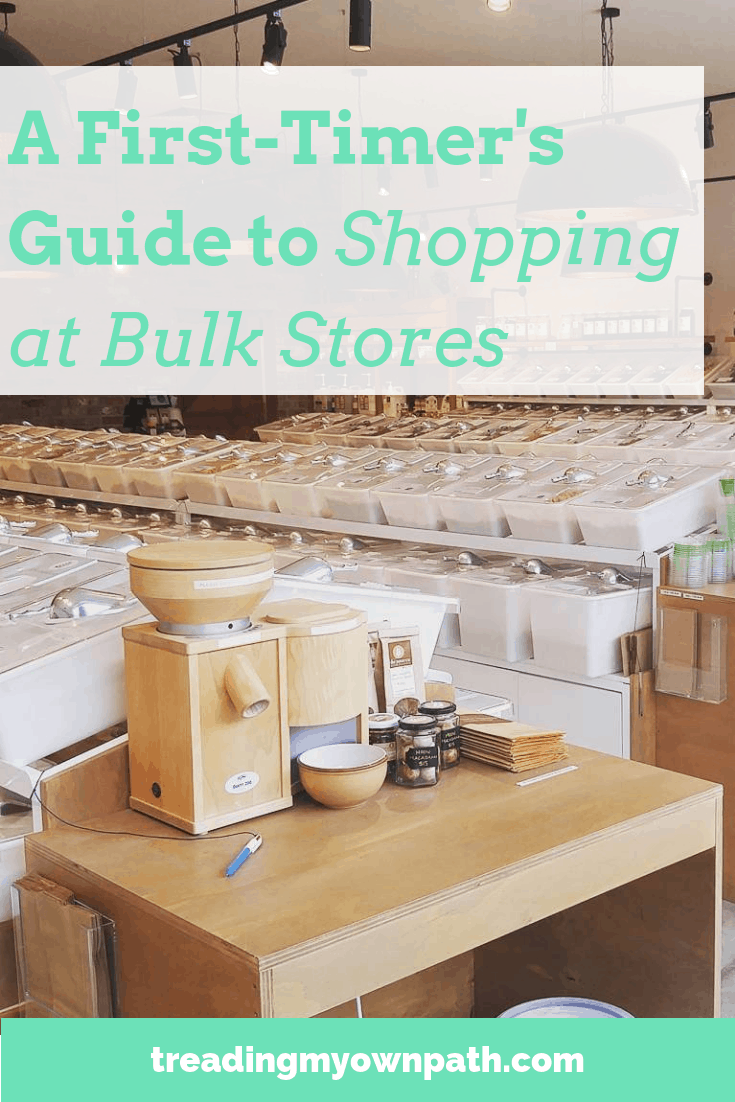

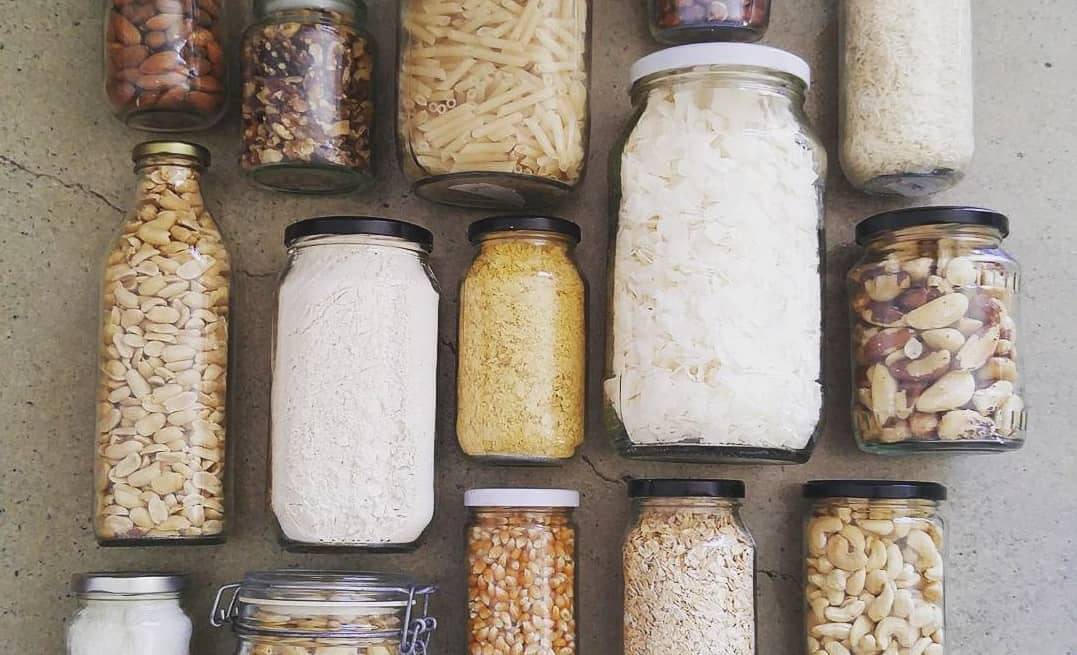




One of my best bulk stores is my local butcher. His scales have a ‘tare’ function which automatically subtracts the weight of my container. My local bulk store Sage and Apple in Balwyn , Melbourne ) will weigh and mark my container but need a calculator to subtract container weight. The Source in Collingwood prefers using their own paper bags but will weigh containers. I usually weigh and mark my own I have also put sticky labels on produce bags for The Source. Storage containers are better because I buy the right amount.
Thanks for sharing Ann. It’s interesting that you say that The Source in Collingwood prefer using their own paper bags. That is not the case with the three stores in Perth. I shop at the Victoria Park store as it is closest to me, and they are super helpful and accommodating with people bringing their own containers. They also sell jars etc. I think all the staff really embrace the whole zero waste concept :)
I love that your local store will still make the effort to calculate the container weight even without scales to do the job. That’s dedication :) Appreciate hearing how different stores make it work!
I make use of public transport to go to bulk stores. My shopping bag weighs too much when I use jars for everything. So I only make use of jars for things such as sugar or flour.
That’s a very good point, Cindy! When I first went plastic-free I took the train to the market where there was a bulk store. I don’t think they would have tared jars anyway, but the groceries were heavy enough to lug all the way down the hill (I did my fruit and veg shop there too), and I was grateful not to be carrying packaging!
Great tips! I don’t have regular access to bulk stores (country Queensland), but if I make a special trip I need to be prepared!
Thanks Liz. Oh I agree, the key thing is to be prepared!
Hi great article I live in sw WA so there are no bulk stores to pop into. I have a small buying club for my friends and work colleagues where I collect everybodies orders monthly ( this enables me to buy a 10kg bag of almonds for eg and we all get them cheaper and reduce plastic packaging ) once I have supplied everyone’s orders I decant the extras into small jars and have a fortnightly market stall .As the word is spreading I often have boxes of clean jars left at my doorstep. I love the community commitment :)
Do you know about this place? Depending on where in the SW you live. http://www.theshedmarkets.com.au
They have a stall in there that sell in bulk
Lucy I just went there at the weekend – Busselton (well, Vasse). I loved it! The fruit and veg shop is awesome too – I did a little insta post showcasing their plastic-free wares and Boomerang bags. Love it!
Whereabouts in SW WA are you Sarah? There’s bulk stores that I know of in Busselton, Pemberton, Margaret River and I’m pretty sure Albany also. There might be more, these are just places I’ve been to!
Love the idea of a buying club! I thought about that when I moved to Vic Park, but luckily the bulk store moved in just before I did, so I didn’t need to in the end :)
Love community commitment too!
Sadly there is no longer one in Pemberton, but is in Bridgetown and Northcliffe.
Whereabouts is the one in Busselton?
I can add Bunbury to your list. Rusticana on Victoria St have a reasonable range of bulk produce.
Good article! Thanks. We have virtually no bulk/loose food shops here in Bournemouth (England) but I was pleased to hear that one of our major retailers, Iceland, intends to go plastic free… (from the Telegraph)
.”Iceland has become the first major retailer to commit to eliminate plastic packaging for all own brand products within five years to help end the “scourge” of plastic pollution.
The retailer said it would be replacing plastic with packaging including paper and pulp trays and paper bags which would be recyclable through domestic waste collections or in-store recycling facilities.
Iceland said it was the first major retailer globally to go “plastic-free” on its own label products and aimed to complete the move by the end of 2023.
It has already removed plastic disposable straws from its own label range and new food ranges set to hit the shelves in early 2018 will use paper-based rather than plastic food trays.”
Fingers crossed then! Hope more follow them.
Hi Bob! I saw this announcement (I read the BBC news). It sounds like a great statement, but I’m intrigued as to how they intend to manage it on a practical level, especially as most of their food is frozen and chilled and packaged. Frozen food tends to be packaged in plastic-lined paper where it isn’t plastic currently. Paper trays is one thing, but how will they secure the stuff to the trays? I will be following this with hopefulness but also a small amount of raised eyebrows! Fingers crossed indeed!
Hi Lindsay
When I grew up in the 1960’s we didn’t have plastic. We didn’t have any real problems, except remembering not to put the paper carrier bags down on wet ground lol. We didn’t have a lot of frozen foods, but what we did have came wrapped in either grease proof paper, cardboard, or both. You just had to be more careful, and shop near to home.
I would think it would also be perfectly feasible to make an insulated bag using natural products. Let’s hipe so anyway.
Great blog btw
I recommend The Pantry Man for those living near Rockingham. The lovely ladies there are always very helpful in weighing my jars before I fill them with dry goodies. The new owner is looking to expand their range. People living near Mandurah definitely have to go to The Glass Jar in Halls Head – a haven for bulk items, dry and liquid! PS. Neither store has paid me to write this! ;-)
I agree! I go out of my way to get to the Pantryman. The staff are so helpful there
Great to hear, Emily!
Does the Pantryman have a new owner, Danielle? It has been recommended to me by participants of the Living Smart courses I’ve run in Kwinana in the past, but I’ve never made it there. Excited that they are expanding the range – more bulk is always good!
If you use a produce bag, do you just accept paying a bit more because you’re paying for the weight of the bag? I notice people often mention cotton bags, which must be a lot heavier than recycled PET produce bags such as Onya’s (the ones I have are 10g). Even 10g is significant when buying something expensive like almonds
I know at the store i use they have the scales set down by 0.05g to go some way to countering the weight of any bag (the paper or plastic ones provided). I made my own bags from scrap nylon netting so they weigh hardly anything but i do accept that I’m probably paying a tiny bit more.
Hi Cathy, depends on the store. The Source will tare the weight of the bags if we know them, and I’ve read of people embroidering weights onto bags for this purpose. I think stores with zero waste principles will generally be happy to.
Some old fashioned stores (with older scales) won’t be able to. For these I’m happy to wear the cost of the weight, but I do tend to make sure the more expensive things are in the lightest bags. I’ll also buy more – 10g out of 100g is an extra 10% of the cost, whereas 10g out of a kilo is only 1% of the cost.
I’ve been shopping at my local Biocoop here in France: I LOVE coming home from there without all the plastic waste I have after doing our weekly shop in a supermarket!! And I have to confess, I quite like the process of decanting all of the products into pretty jars too – the shop provides paper bags for dry goods. Much as I enjoyed your post, I’m not sure I’d be able to cope with taking jars in and having to work out prices after weight: that sounds way too complicated for my tiny brain… especially for a family of six! Keep writing, I love reading your work :)
Bulk stores are great, aren’t they Chloe?! I’ve only been bringing my glass jars to the store since I moved to Vic Park and started shopping at the source. None of the other stores are set up as well as these guys. I’d use produce bags before. I also used to have to take the train, and produce bags are a lot easier.
Thanks, I will! :)
Thank you for sharing your tips! Since I’ve never been in a bulk shop before (but there is one going to open in my region soon! :D), I’ve always wondered how it actually works in detail. Now, I know how to prepare the first shopping once it opens. :)
As I said Frieda, they are all slightly different, but I’m pretty sure I can tell you that the staff will be super helpful and if you have any questions, ask them! Good luck :)
Thanks. Yes, I’m aware they are all different, but your post makes me feeling less unprepared and overwhelmed and that IS a good thing. :D
Since I don’t have an Instagram-account I also wanted to tell you here that I love your Instagram-Posts “31 Days of Plastic Free”. Though not all tips are new and you mentioned many things already on your blog, it is very motivating to read them there again.
Well, I loved this post! Simply because it got me thinking in a different way. I can only think of one store here were we live that operate a bit like this and I always thought I had to use their brown bags … which is ultimately just a waste (although at least they are recyclable). I love the idea of taking your own containers and will ask them next time if I can do that! It doesn’t just save on waste but it also saves on time so I don’t have to come home and repack :) Love it!
Our first ‘bulk store’ in Wales, UK has recently opened up – ‘Natural Weigh’ in Crickhowell. Super range of goods and we are all currently learning how to use it (it’s only been open a week). You take in your own containers, and weigh them empty to get a Tare weight printed on a barcode sticker. You then weigh your container again after filling it, scan the first barcode, select your product and you get a second barcode sticker with the final net weight and cost. Latter is then scanned at checkout and you pay..They also sell robust bags for those without their own containers. A new way of shopping indeed – lots of good things for bakers and muesli-makers!
We are currently planning our first visit next week to a bulk store about 2 hours away so reading up and comparing prices between shops in advance as much as I can. Also trying to work out what and how much we may need if we can only go once a month. Thanks for the reminder to make a list. I am usually pretty good with shopping lists but feel like I am getting so excited about this trip that I may loose control once there.
I found a little shop here in Plymouth (UK) which does refills on liquid detergent etc so am at the moment in great anticipation of the washing up liquid running out any day now so I can go and refill it.
Our bulk store is actually walkable distance – it’s closer than the supermarket! Thanks for the tips, I’m excited to begin looking into creating less waste!
I’ve noticed that in the time I’ve been shopping at the grocery store, I can save some items such as glass spice jars, peanut butter jars, and yogurt containers. Do you have tips for cleaning out the jars well and removing their original labels? Favorite jars that you always save?
Thanks :)